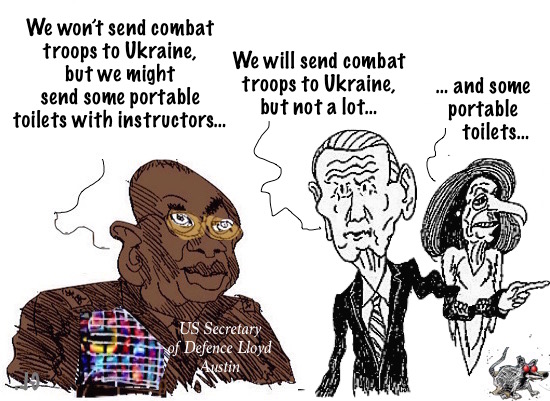Search
Recent comments
- 100.....
2 hours 49 min ago - epibatidine....
8 hours 41 min ago - cryptohubs...
9 hours 39 min ago - jackboots....
9 hours 47 min ago - horrid....
9 hours 55 min ago - nothing....
12 hours 18 min ago - daily tally....
13 hours 40 min ago - new tariffs....
15 hours 32 min ago - crummy....
1 day 9 hours ago - RC into A....
1 day 11 hours ago
Democracy Links
Member's Off-site Blogs
not a lot...
 not a lot...
not a lot...
US President Joe Biden announced that Washington would boost its military presence at Russia’s doorstep with more troops that would be moved to the countries in Eastern Europe in the near future. The US leader made the remark while speaking to the media on Friday evening.
Biden gave updates on the situation in Ukraine after he emerged from Air Force One.
Asked about if he had already decided “how soon” he “would be moving US troops to Eastern Europe”, Biden reportedly said that he would sent a small number of American servicemen to the region “in the near term.”
“I'll be moving US troops to Eastern Europe in (or he possibly says and) the NATO countries in the near term. Not a lot,” CBSNews’ Senior White House Correspondent Weijia Jiang reported.
From the WH press pool report—POTUS: “I’ll be moving US troops to Eastern Europe in (or he possibly says “and”) the NATO countries in the near term. Not a lot.”
— Weijia Jiang (@weijia) January 28, 2022
On Monday, the Pentagon announced that some 8,500 American troops have been placed on“heightened alert” to deploy to Eastern Europe.
Speaking at a briefing earlier on Friday, US Secretary of Defense Lloyd Austin said that these troops would be used to “reinforce security on NATO’s eatern flank”, adding that a hypothetical Russian attack would face “unified” response from the US-led military block. While Ukraine is not a NATO member, Austin warned Moscow about retaliation in case it attacks a member of the alliance, saying: “An attack against one NATO member is an attack against us all.”
He, however, appeared to rule out involvement of US troops in any military action in Ukraine itself. Biden “does not intend to put troops into Ukraine for combat operations", the Pentagon chief said.
Read more:
https://www.rt.com/news/547696-american-troops-eastern-europe/
FREE JULIAN ASSANGE NOW !!!!!!!!!!!!
- By Gus Leonisky at 29 Jan 2022 - 2:37pm
- Gus Leonisky's blog
- Login or register to post comments
enough is enough...
A number of Washington’s normally steadfast European allies have begun distancing themselves from the US’s increasingly confrontational approach to the standoff over Ukraine. However, despite the White House’s appeals for unity, the cracks in its foreign policy partnerships are beginning to show.
A West that agrees on less is one where Russia’s efforts to get concessions on security arrangements are more likely to succeed, but also one where America must crack the whip against it to keep its bloc in line.
A growing split?After the Cold War, NATO changed its mission from collective defence to collective hegemony. NATO could monopolise on security during the unipolar era and ignore Russian security concerns. As a multipolar order has slowly returned, the West is under growing pressure to accept a compromise. Russia has made its economy somewhat sanctions-proof by reducing economic dependence on the West, and the military has been modernised to uphold red lines against further NATO expansionism.
Stuck in its old hegemonic mindset, American tools for resolving the current crisis are seemingly limited to using economic and military pressure rather than recognising legitimate Russian security concerns. However, European countries such as Germany, France, and Italy are becoming increasingly wary about being on the US frontline against Russia. Further sanctions on Russia will likely hurt the European economies more, and further military posturing can embolden Kiev to invade Donbass and thus spark a major war with Russia.
German dissent is obvious, as Berlin refused Estonia re-export licenses to send German-made howitzers to Ukraine. The country has also refused to include the threat of scrapping the Nord Stream 2 gas pipeline in the US sanctions-package against Russia, which would give Washington and Kiev a powerful incentive to intensify the conflict with Russia. In France, President Emmanuel Macron suggested establishing an EU security pact with Russia, independent of the US, as “it is necessary that Europeans conduct their own dialogue.”
The divisions within the West are, at first glance, a positive development for Russia. US Secretary of State Antony Blinken had hoped to be able to meet Russian Foreign Minister Sergey Lavrov with credible threats of military and economic consequences by a united West. Instead, Blinken had to tone down the confrontational rhetoric and promise Lavrov a written response to the security guarantees that Russia demands. Washington has asked Moscow to keep the US response on security guarantees a secret, which is an indication that some form of compromise may be forthcoming.
Restoring bloc disciplineHowever, the divisions in the West will also have negative consequences for Russia, as unity must be restored with anti-Russian propaganda. A key purpose of propaganda is to elevate the perceived threat of the out-group (Russia) and to instill solidarity within the in-group (NATO). The main lesson from the years of the Russiagate hoax should be that attempts to challenge alliance solidarity by reaching out to Russia is met with a cascade of anti-Russian propaganda.
READ MORE:
https://www.rt.com/russia/547441-west-nato-disunity-danger/
SEE TOON AT TOP.
FREE JULIAN ASSANGE NOW !!!!!!!!!!!!